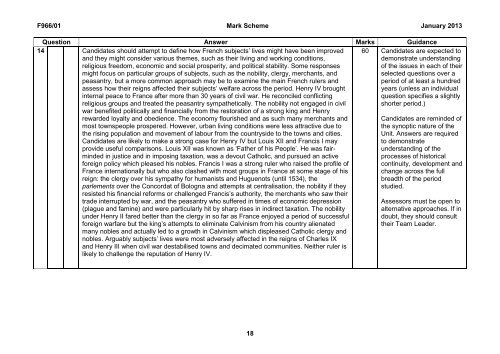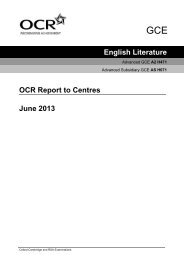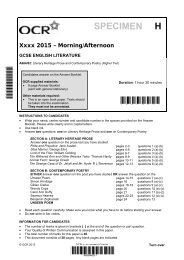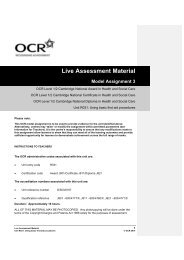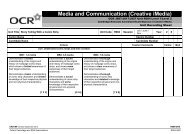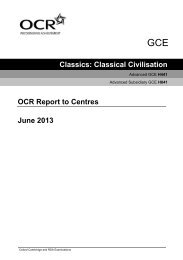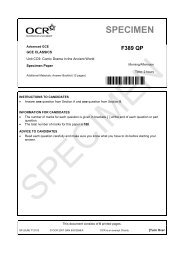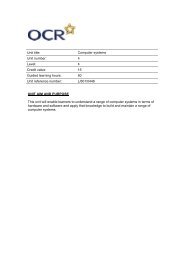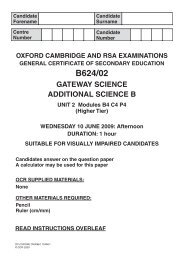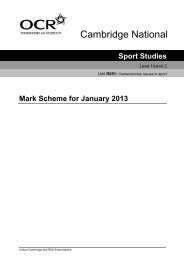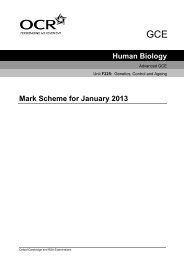Mark scheme - Unit F966/01 - Historical themes - Option A - OCR
Mark scheme - Unit F966/01 - Historical themes - Option A - OCR
Mark scheme - Unit F966/01 - Historical themes - Option A - OCR
Create successful ePaper yourself
Turn your PDF publications into a flip-book with our unique Google optimized e-Paper software.
<strong>F966</strong>/<strong>01</strong> <strong>Mark</strong> Scheme January 2<strong>01</strong>3<br />
Question Answer <strong>Mark</strong>s Guidance<br />
14 Candidates should attempt to define how French subjects’ lives might have been improved<br />
and they might consider various <strong>themes</strong>, such as their living and working conditions,<br />
religious freedom, economic and social prosperity, and political stability. Some responses<br />
might focus on particular groups of subjects, such as the nobility, clergy, merchants, and<br />
peasantry, but a more common approach may be to examine the main French rulers and<br />
assess how their reigns affected their subjects’ welfare across the period. Henry IV brought<br />
internal peace to France after more than 30 years of civil war. He reconciled conflicting<br />
religious groups and treated the peasantry sympathetically. The nobility not engaged in civil<br />
war benefited politically and financially from the restoration of a strong king and Henry<br />
rewarded loyalty and obedience. The economy flourished and as such many merchants and<br />
most townspeople prospered. However, urban living conditions were less attractive due to<br />
the rising population and movement of labour from the countryside to the towns and cities.<br />
Candidates are likely to make a strong case for Henry IV but Louis XII and Francis I may<br />
provide useful comparisons. Louis XII was known as ‘Father of his People’. He was fairminded<br />
in justice and in imposing taxation, was a devout Catholic, and pursued an active<br />
foreign policy which pleased his nobles. Francis I was a strong ruler who raised the profile of<br />
France internationally but who also clashed with most groups in France at some stage of his<br />
reign: the clergy over his sympathy for humanists and Huguenots (until 1534), the<br />
parlements over the Concordat of Bologna and attempts at centralisation, the nobility if they<br />
resisted his financial reforms or challenged Francis’s authority, the merchants who saw their<br />
trade interrupted by war, and the peasantry who suffered in times of economic depression<br />
(plague and famine) and were particularly hit by sharp rises in indirect taxation. The nobility<br />
under Henry II fared better than the clergy in so far as France enjoyed a period of successful<br />
foreign warfare but the king’s attempts to eliminate Calvinism from his country alienated<br />
many nobles and actually led to a growth in Calvinism which displeased Catholic clergy and<br />
nobles. Arguably subjects’ lives were most adversely affected in the reigns of Charles IX<br />
and Henry III when civil war destabilised towns and decimated communities. Neither ruler is<br />
likely to challenge the reputation of Henry IV.<br />
60 Candidates are expected to<br />
demonstrate understanding<br />
of the issues in each of their<br />
selected questions over a<br />
period of at least a hundred<br />
years (unless an individual<br />
question specifies a slightly<br />
shorter period.)<br />
Candidates are reminded of<br />
the synoptic nature of the<br />
<strong>Unit</strong>. Answers are required<br />
to demonstrate<br />
understanding of the<br />
processes of historical<br />
continuity, development and<br />
change across the full<br />
breadth of the period<br />
studied.<br />
Assessors must be open to<br />
alternative approaches. If in<br />
doubt, they should consult<br />
their Team Leader.<br />
18


